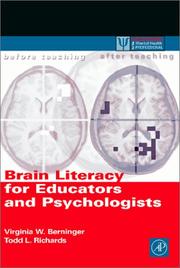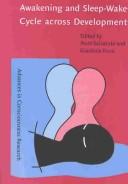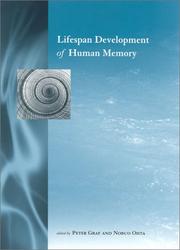| Listing 1 - 3 of 3 |
Sort by
|

ISBN: 128103262X 9786611032623 0080500269 0585469113 012092871X 1493300105 9780585469119 9780120928712 9781281032621 9780080500263 Year: 2002 Publisher: Amsterdam Boston Academic Press
Abstract | Keywords | Export | Availability | Bookmark
 Loading...
Loading...Choose an application
- Reference Manager
- EndNote
- RefWorks (Direct export to RefWorks)
Although educators are expected to bring about functional changes in the brain--the organ of human learning--they are given no formal training in the structure, function or development of the brain in formal or atypically developing children as part of their education. This book is organized around three conceptual themes: First, the interplay between nature (genetics) and nurture (experience and environment) is emphasized. Second, the functional systems of the brain are explained in terms of how they lead to reading, writing and mathematics and the design of instruction. Thirdly, research is
Brain. --- Neurophysiology. --- Developmental neurobiology. --- Learning. --- Learning process --- Developmental neurology --- Neurogenesis --- Nervous system --- Cerebrum --- Mind --- Physiology --- Comprehension --- Education --- Developmental biology --- Embryology --- Neurobiology --- Neuroplasticity --- Central nervous system --- Head --- Evolution

ISBN: 9786612255038 1282255037 0585461295 9027297886 9780585461298 9781588111746 1588111741 9789027297884 661225503X 9781282255036 9027251584 Year: 2002 Publisher: Philadelphia J. Benjamins Pub.
Abstract | Keywords | Export | Availability | Bookmark
 Loading...
Loading...Choose an application
- Reference Manager
- EndNote
- RefWorks (Direct export to RefWorks)
Sleep and wakefulness undergo important changes with age. Awakening, a crucial event in the sleep-wake rhythm, is a transition implying complex physiological mechanisms. Its involvement in sleep disturbances is also well known. This collective volume is the first attempt to systematically approach awakening across development.A methodological section considers criteria to define awakening in a developmental perspective. Theoretical considerations on development of wakefulness and on its relation to consciousness are included and provide a vigorous impulse to go beyond present criteria and classifications.Age changes are the core of studies on development: a section of the book examines old and new data from preterm to infants up to children, underscoring the main turning points along this developmental path. As for other aspects of development, awakening and the sleep-wake cycle are also influenced by external factors, both physical and human. Several contributions deal with this topic, in particular focusing on the parent-infant interaction and the influences of culture.Clinical contexts offer an opportunity to show both quantitative and qualitative changes of awakening and arousals in different pathological conditions. Either partial changes of one physiological variable or global and massive changes can be observed. (Series B).
Developmental neurobiology. --- Sleep-wake cycle. --- Cycle, Sleep-wake --- Patterns, Sleep --- Sleep cycle --- Sleep patterns --- Wake-sleep cycle --- Circadian rhythms --- Developmental neurology --- Neurogenesis --- Developmental biology --- Embryology --- Neurobiology --- Nervous system --- Neuroplasticity --- Evolution

ISBN: 1282099876 9786612099878 0262274205 0585436711 026229320X 9780262274203 9780585436715 026207236X 9780262072366 9781282099876 6612099879 Year: 2002 Publisher: Cambridge, Mass. MIT Press
Abstract | Keywords | Export | Availability | Bookmark
 Loading...
Loading...Choose an application
- Reference Manager
- EndNote
- RefWorks (Direct export to RefWorks)
An original approach to memory development that views memory as a continuous process of growth and loss over the human lifespan rather than as a series of separate periods. Until recently, the vast majority of memory research used only university students and other young adults as subjects. Although such research successfully introduced new methodologies and theoretical concepts, it created a bias in our understanding of the lifespan development of memory. This book signals a departure from young-adult-centered research. It views the lifespan development of memory as a continuous process of growth and loss, where each phase of development raises unique questions favoring distinct research methods and theoretical approaches. Drawing on a broad range of investigative strategies, the book lays the foundation for a comprehensive understanding of the lifespan development of human memory. Topics include the childhood and adulthood development of working memory, episodic and autobiographical memory, and prospective memory, as well as the breakdown of memory functions in Alzheimer's disease. Of particular interest is the rich diversity of approaches, methods, and theories. The book takes an interdisciplinary perspective, drawing on work from psychology, psychiatry, gerontology, and biochemistry.
Memory. --- Memory in children. --- Memory in old age. --- Alzheimer's disease. --- Developmental neurobiology. --- Developmental neurology --- Neurogenesis --- Alzheimer disease --- Alzheimer's dementia --- Memory in the aged --- Retention (Psychology) --- Developmental biology --- Embryology --- Neurobiology --- Nervous system --- Neuroplasticity --- Basal ganglia --- Presenile dementia --- Senile dementia --- Older people --- Child psychology --- Intellect --- Psychology --- Thought and thinking --- Comprehension --- Executive functions (Neuropsychology) --- Mnemonics --- Perseveration (Psychology) --- Reproduction (Psychology) --- Evolution --- Diseases --- COGNITIVE SCIENCES/General --- COGNITIVE SCIENCES/Psychology/Cognitive Psychology --- Aging --- Human Development. --- Memory --- Neuropsychology. --- physiology. --- Life Expectancy. --- Adulte --- Enfant --- Mémoire à long terme --- Memoire de travail --- Mémoire épisodique --- Mémoire --- Personnes âgées --- Troubles de la mémoire --- Life Expectancy --- Mémoire. --- Chez l'enfant --- Chez la personne âgée.
| Listing 1 - 3 of 3 |
Sort by
|

 Search
Search Feedback
Feedback About UniCat
About UniCat  Help
Help News
News